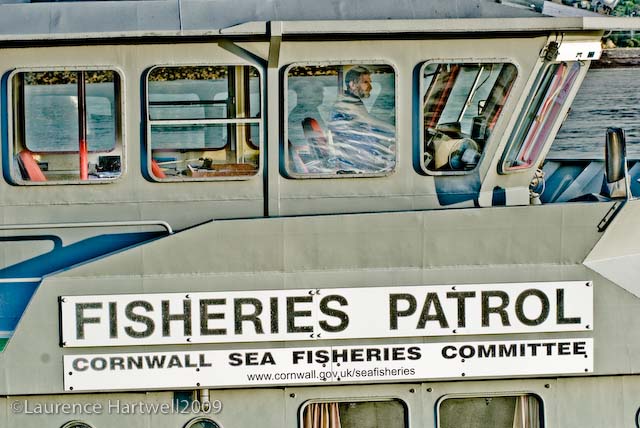 |
| CSFC boss Eddie Derriman at the helm of the fisheries patrol boat St Piran under its old nomenclature. |
The last meeting of the Cornwall SFC was held at the County Hall, Truro on Friday (18 March), where Chief Fishery Officer Eddie Derriman gave a talk on the history of SFCs; and the final meeting of Devon SFC will take place at Plymouth City Council Offices this Friday, where its Chief Fishery Officer Keith Bower will present 26 pages of history and anecdotes since Devon SFCs inception in 1892. Cornwall SFC was the second of 12 SFCs that were vested and “much has happened during the 121 years it has been in place,” explained Mr Derriman, adding how the service began with a lone fishery officer who patrolled the ports and worked from home, a service which now has 11 personnel. Originally the committee had just 24 members.
The first Cornwall SFC byelaw came in 1890 as the ‘Steam Trawling Byelaw’ made on 20 August, only five months after the committee was created to prevent steam powered trawlers from working within the SFCs jurisdiction, then being three miles from the lowest drying rock. Only in 1993 did all SFCs extend their powers out to six-miles offshore.
 |
| Salt pilchards in a wooden cask bound for Italy. |
Devon SFCs history is similar, yet in practice Devon SFCs actions and operations were quite different. That ‘difference’ applied to all neighbouring SFCs. While having adjoining borders, fishing practices within each SFC are often widely different – and the valuable local knowledge of that difference may be lost within IFCAs, fear many.
Devon SFCs first elected chairman was the Mayor and Chief Magistrate of Plymouth, Mr Windeatt, “well known to all as one who had given a lot of time to fishery matters,” writes Keith Bower. He explained how SFCs began during a Victorian era when technology was moving fast, steam powered vessels were replacing sail; fish and shellfish stocks were increasingly under pressure. Soon came the Devon SFC byelaw to curtail the use of trammel nets, one net should not exceed 70 fathoms in length and not to be set within 50 fathoms of another. Some committee members sought help to understand what a trammel net was! On 11 September 1892 Devon SFC held a meeting with Torquay fishermen hearing that “the destruction of mother-fish, spawn and young fish by trawlers had almost ruined the fishing in Torbay”. Fishermen told how before more Brixham trawlers wandered onto inshore ground, they could make a living with nets and lines set close to the shore; predicting how over fishing by such trawlers would invite other countries such as Germany to benefit from the conflict and quickly supply the UK with that shortfall of fish.
From that conflict stemmed the three mile limit, within which trawling was quickly banned, the committee were told how the “big Brixham trawlers” would not be affected and were not to blame as they “did not desire to fish in Torbay, it was the small ones that did the mischief”.
Such offenders were skilfully waiting for line fishermen – known as hookers – to run out of bait. Yet after the hookers ceased fishing the smell of their bait remained in the seawater and had attracted many fish into a relatively small area; the small trawlers quickly moved-in to scoop-up whatever was on the seabed – often ripping away the long lines from the few remaining hookers too!
Article courtesy of Phil Lockley.
No comments:
Post a Comment